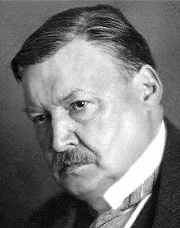Alexander Glazunov
Glazunov was born in Saint Petersburg, the son of a wealthy publisher. He began studying piano at the age of nine and began composing at 11. Mily Balakirev, former leader of the nationalist group "The Five", recognized Glazunov's talent and brought his work to the attention of Nikolai Rimsky-Korsakov. "Casually Balakirev once brought me the composition of a fourteen- or fifteen-year-old high-school student, Alexander Glazunov", Rimsky-Korsakov remembered. "It was an orchestral score written in childish fashion. The boy's talent was indubitably clear." Balakirev introduced him to Rimsky-Korsakov shortly afterwards, in December 1879. Rimsky-Korsakov premiered this work in 1882, when Glazunov was 16. Borodin and Stasov, among others, lavishly praised both the work and its composer.
Rimsky-Korsakov taught Glazunov as a private student. "His musical development progressed not by the day, but literally by the hour", Rimsky-Korsakov wrote. The nature of their relationship also changed. By the spring of 1881, Rimsky-Korsakov considered Glazunov more of a junior colleague than a student. While part of this development may have been from Rimsky-Korsakov's need to find a spiritual replacement for Modest Mussorgsky, who had died that March, it may have also been from observing his progress on the first of Glazunov's eight completed symphonies (he left a ninth unfinished at his death).
Glazunov toured Europe and the United States in 1928, and settled in Paris by 1929. He always claimed that the reason for his continued absence from Russia was "ill health"; this enabled him to remain a respected composer in the Soviet Union, unlike Stravinsky and Rachmaninoff, who had left for other reasons. In 1929, he conducted an orchestra of Parisian musicians in the first complete electrical recording of The Seasons. In 1934, he wrote his Saxophone Concerto, a virtuoso and lyrical work for the alto saxophone.
Glazunov died in Neuilly-sur-Seine (near Paris) at the age of 70 in 1936. The announcement of his death shocked many, who had long associated Glazunov with the music of the past rather than of the present and assumed he had already been dead for many years.
In 1972 his remains were reinterred in Leningrad.














 My Wish List
My Wish List










